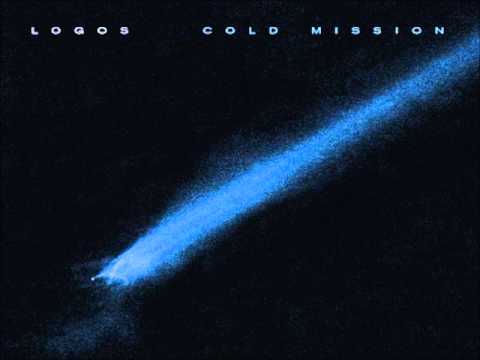Logos’ debut album, Cold Mission, is a little bit of a masterpiece. It’s an album that, frankly, I’ve been waiting a long time for someone to make. A record that unites a handful of my own musical interests, fusing numerous styles, approaches and sentiments, whilst drawing as palpably from the complex minimalism of modern classical composition as it does the brutishness of late night London’s radio transmissions. What that then says about my own listening habits is probably best left to interpretation, but within the recent slew of brazen instrumental grime that’s been piloted by characters like Slackk, Visionist and outfits like Oil Gang, Keysound and new Irish label Glacial Sound, there are artists whose work just juts out from the rest of the pack like massive glinting stalagmites: Rabit and his uber-melodic sparsity, Murlo’s boundless and playful nature, or Mumdance’s command of hardware. But it’s Logos’ reinterpretation of classic grime tropes, and his restrained deployment of them, that’s been one of the most enjoyable things to follow.
First breaking out with his much-mooted Kowloon EP on Dusk & Blackdown’s Keysound label – a four tracker that marked James Parker out as a thinker and producer whose music cared more about sense of place and sound palette than immediacy in the club – when he emerged Logos’ work was decidedly different to most of what was around at the time. And especially within grime music – I feel like that’s a very important distinction that needs to be made. The material on Cold Mission, while using the same calling-card hollow-sounding synths and, in many cases, the very same sounds as early grime producers like Wiley or Jon E Cash, sounds nothing like what someone would actually expect grime to sound like. It’s not a distilled, iconic version of it; there’s seldom a brutish chug, spray of scattergun snare drums or chorus of rousing cheap MIDI string stereotypes. So much so that it becomes almost impossible not to use a phrase like ‘grime deconstructivist’ when talking about Logos’ eleven track debut full-length (even though I promised myself I wouldn’t).
"When I started writing the stuff that came out on Keysound, I don’t think I was ever consciously writing grime as I saw it," offers Parker himself, speaking between nibbles of an artisan sandwich, all salty sweet with a bounty of gherkins and mustard. "Partly because of what had happened to grime at that point. I wasn’t really into the sound, more than anything; the sound of the production.
"Grime is not a huge organising principle behind how I approach making music," he continues, reluctant but conscious to stress his point. "I’m involved with Boxed [grime-centred London night, co-founded by Logos] and stuff, so I do play grime, but I don’t see myself as being a core, or ‘full grime’ producer. I’m interested in doing other things with the format – using some of the ideas and then taking them somewhere else. Marrying the sonic language from grime with some of the ideas like the devil mix, and stripping the obvious rhythm away but still leaving space for implicit rhythm – or just enough that people will still dance."
‘Seawolf’, taken from the Cold Mission albumIn fracturing and prising apart the sounds and moods involved in early grime whilst exploring the potently unsettling, drumless ‘devil mix’ aesthetic pioneered by ‘Eskimo’-era Wiley, Logos excels in his creation of rhythm without using traditional rhythmic devices. Massive sections of Cold Mission are actually quite serenely beatless, with Parker either implying a pulse through groove and texture, or choosing to use drum and percussion sounds so sparely that they never form into a fully rolling rhythm – instead using them more as punctuation.
“It wasn’t really a high concept album where I’d written down concepts and thoughts [for it],” he offers, after spending an extended silence pondering the theme of his music. “The ideas were more about pushing the forms as far as you can go,” he settles. “It’s hard to visualise, but [it’s like] taking a grime record, which is a big distending of parts, and then reducing it all down to the minimum it could go and then placing it there for the listener. That’s more how I thought about it; that’s about the level of serious, theoretical thought,” he smiles.
It’s a gloriously simple idea: using the sonic signals planted by grime pioneers like Jon E Cash and Danny Weed, and brains like Digital and 4Hero and the other producers behind dread-heavy late 90s jungle as isolated inspirations. But to listen to Cold Mission it feels more like Logos is ploughing through some of the music he loves, and using its signifiers as starting point for a completely different kind of conversation. It’s kind of like the way we discussed the work of an artist like Danny Weed, and how Weed appeared out of nowhere, dropped a limited body of work, and then seemingly disappeared, letting his take on the grime form linger for people to do whatever they wanted with it. Parker just wants to put it out there.
It’s also interesting to consider the ideas at the heart of Cold Mission, and the way that its maker interprets other people’s output more as a question. It becomes an extra theme in itself, one whose traces run through the entirety of the album: through the lingering atmospheric tendrils of ‘E3 Night Flight’ and ‘Stasis Jam,’ the gun-cocking impact percussion on ‘Seawolf’ and on into the Mumdance collaboration ‘Wut It Do’, which postures quite neatly alongside the current jungle revival piloted by artists like Special Request, before the specially extended stand out style of album closer, ‘Atlanta 96’.
Logos’ attitude is probably best outlined by his recent FACT mix, where he unites stark spatial explorations with vivid grime from his Boxed cohorts and harder hitting drum exercises from the club focused Night Slugs/Fade To Mind axis. As well as being the perfect scene-setting introduction to his own music, it’s actually helped further contextualise Cold Mission (as well as the music he’s drawing from), acting as a bullet pointed guide to the camps he’s currently got a stylistic foot planted in. But it really does feel like Logos is alone out there, making records that sing with the poise and inner city concrete geography of early Burial while simultaneously sounding like the realisation of a hazily sketched modern genre Venn diagram. It’s that ability and outlook that really defines Cold Mission, without ever constricting it. Logos allows himself to wander free, and to try a bunch of remarkably different things sonically. Although his excursions do incite pangs for longer-form explorations of some of the approaches he applies himself to – especially his ability to evoke sensations of weightlessness – as a whole he’s managed to build something that works gloriously, as an immersive listen as much as artefact.
"I’m not interested in being nostalgic," he states quite plainly, as if to summarise. "You could criticise my work for referencing the past, but that’s not the same thing. The palette is quite stark, partly because I was trying to become a non-overly fussy producer, but it’s about presenting sounds and space and allowing the music to develop in a way that isn’t necessarily that obvious to the listener. One of my big influences in music is minimalism in the classical world – people like Steve Reich or Philip Glass – and minimalism can mean different things. It can be about having a lot of material, of information, and presenting it in a way that doesn’t move in a normal, Western music way; or it can mean simply not very many elements. I feel like I did both those things on some of the tracks…"
Logos’ Cold Mission is out now via Keysound.
And for more on grime, dance music, sub-bass and frosty beats, click here to visit the Sonic Router website



